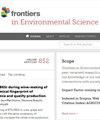欧盟国家环境绩效和循环经济的发展:"2004 年后 "成员国的情况
IF 3.3
3区 环境科学与生态学
Q2 ENVIRONMENTAL SCIENCES
引用次数: 0
摘要
本研究旨在比较 2004 年及以后加入欧盟的欧盟国家集团内部的环境效率,并确定效率的共同循环经济决定因素。为此,我们进行了数据包络分析和相关分析。我们采用了规模收益不变模型和规模收益可变模型。研究结果表明,以服务业(尤其是旅游业)为重点的国家具有更高的环境效率。然而,大多数国家仍然严重以工业为导向,其中保加利亚、罗马尼亚和克罗地亚的效率最低。研究还强调,需要大力减少温室气体排放。有趣的是,研究发现资源生产率与所使用的循环材料之间存在正相关,这表明循环经济工具在改善环境方面的重要性。尽管这些国家的材料和消费足迹较高,但其产品产量和二氧化碳排放量仍然相对较低。基于这些分析,我们发现了地区差异以及在欧盟层面制定循环经济集群政策的必要性。本文章由计算机程序翻译,如有差异,请以英文原文为准。
Development of environmental performance and circular economy in the European Union countries: the case of “post-2004” members
The study aims to compare the environmental efficiency within the group of European Union countries that joined the European Union in 2004 and later, and to identify the common circular economy determinants of efficiency. For this purpose, we performed Data Envelopment analysis and correlation analysis. We applied both constant and variable returns to scale models. Findings reveal that countries with a significant focus on services, particularly tourism, are more environmentally efficient. However, most countries are still heavily industry-oriented, with Bulgaria, Romania, and Croatia being the least efficient. The study also highlights the need for significant efforts to reduce greenhouse gas emissions. Interestingly, a positive correlation was found between resource productivity and the circular materials used, suggesting the importance of circular economy tools in improving the environment. Despite having a higher material and consumption footprint, these countries still produce a relatively high product and relatively low CO2 emissions. Based on these analyses, we found regional differences and the need for setting cluster policies within the circular economy at the European Union level.
求助全文
通过发布文献求助,成功后即可免费获取论文全文。
去求助
来源期刊

Frontiers in Environmental Science
Environmental Science-General Environmental Science
CiteScore
4.50
自引率
8.70%
发文量
2276
审稿时长
12 weeks
期刊介绍:
Our natural world is experiencing a state of rapid change unprecedented in the presence of humans. The changes affect virtually all physical, chemical and biological systems on Earth. The interaction of these systems leads to tipping points, feedbacks and amplification of effects. In virtually all cases, the causes of environmental change can be traced to human activity through either direct interventions as a consequence of pollution, or through global warming from greenhouse case emissions. Well-formulated and internationally-relevant policies to mitigate the change, or adapt to the consequences, that will ensure our ability to thrive in the coming decades are badly needed. Without proper understanding of the processes involved, and deep understanding of the likely impacts of bad decisions or inaction, the security of food, water and energy is a risk. Left unchecked shortages of these basic commodities will lead to migration, global geopolitical tension and conflict. This represents the major challenge of our time. We are the first generation to appreciate the problem and we will be judged in future by our ability to determine and take the action necessary. Appropriate knowledge of the condition of our natural world, appreciation of the changes occurring, and predictions of how the future will develop are requisite to the definition and implementation of solutions.
Frontiers in Environmental Science publishes research at the cutting edge of knowledge of our natural world and its various intersections with society. It bridges between the identification and measurement of change, comprehension of the processes responsible, and the measures needed to reduce their impact. Its aim is to assist the formulation of policies, by offering sound scientific evidence on environmental science, that will lead to a more inhabitable and sustainable world for the generations to come.
 求助内容:
求助内容: 应助结果提醒方式:
应助结果提醒方式:


